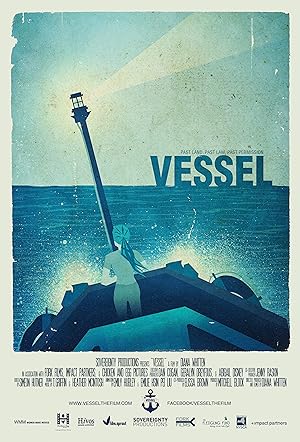Vessel is a documentary that chronicles an international group of women forming Dutch nonprofit organizations such as Women on Waves to find legal loopholes to provide abortions to women around the world. Because most people who benefit from their services keep their identity secret because of fear of reprisals, not seeing the people does detract from viewers ability to completely empathize with an ordinary person’s plight, which was what made How to Survive a Plague so emotionally resonant. So the opposition’s intimidation works because without a real person to relate to, the viewers can only empathize with the activists, which may or may not be possible depending on whether or not you agree with their beliefs. This documentary is more than a preach to the choir film although if you are instinctually against opposing views, particularly issues regarding reproductive rights, you will probably want to skip this movie since you will be unable to get pass their belief that every woman has a right to complete physical autonomy in order to empathize with their process and accomplishments.
Vessel is reminiscent to How to Survive a Plague because while this film is not as compelling or spans decades like the earlier documentary, it also documents the growing pains of resisting various governments in order to deal with a medical crisis that is leading to thousands of deaths. While many critics complained about the lackluster approach to such a polemic issue as abortion, this documentary serves a general and specific purpose that benefits from not being sensational.
Vessel can serve as a model for other activist organizations. “If good health care isn’t accessible in the law, then what does that mean.” The movie explores the various methods that are effective or ineffective in various political climates in different countries and shows that failure is not final. Failure is just another form of outreach. The film depicts how the organization evolved and branched off into distinct directions to meet various needs and took advantage of different avenues that lead to better communication with its targeted audience, women not being served by their communities that feel alone.
It is easy to lose sight of the real focus of Vessel since it ostensibly seems more like a profile of the founder of Women on Waves, Dr. Rebecca Gomperts. While Dr. Gomperts is a dynamic figure, fellow activists seem to somewhat resent how she is equated with the organization and take great pains to distinguish her from the movement instead of conflating the two. So if viewers make the same mistake while watching the documentary, it would be completely understandable and may explain why some viewers could not completely enjoy it. Unlike most women, Dr. Gomperts has overcome the need to get everything perfect before executing it, is comfortable with flying by the seat of her pants and is constantly improvising. Many complain that this approach is frustrating for those that rely upon her, but considering that for many, she is the only show in town, shrug. As the movie unfolds, she is comfortable with letting others take center stage and draw focus that alleviated my concerns that it was more about attention than the cause (achoo *Assange*). She may be a lightening rod, but she is also a mentor who is more interested in empowering others instead of retaining power.
Vessel is also an instructional video on how to perform medical, i.e. non-surgical, abortions. The movie not only shows people disseminating this information, but it acts as a distributor of this information as well so people without access to the ocean or the internet may have access to the film. While it may not be entertaining and repetitive to constantly see diagrams and demonstrations of how to administer misoprostol and avoid violating the law, it is educational. A film can reach even more people than their hotline. By the end of Vessel, in Tanzania, there are just as many men as women interested in learning about the non-surgical methods and how to evade the law so it is arguably more important that this documentary serves this function rather than captivate an audience.
When I saw Vessel, there were some technical issues. I was streaming it on Netflix, and I normally turn on closed captioning to read what people are saying, which reduces confusion for me since I’m a better reader than listener, especially when there are so many accents. When people were speaking in different languages, the closed captioning would not permit the translation to be shown simultaneously so I eventually had to turn it off and rewatch certain portions of the documentary.
Vessel does work on a human level. The amount of opposition (cue the warships, I’m not kidding) is disproportionate to the organization, and the brief glimpse of innumerable stories told in voice mails and emails are staggering. The documentary never loses sight of the reason behind their efforts and creativity and shows as ordinary women join the campaign.
Vessel may not be a flawless documentary, but it is functionally perfect. It is a must see movie for advocates of different issues on how to move forward despite facing considerable opposition and for those who do not have access to abortion services whether or not it is legal in your area. For anyone else, skip it.
Stay In The Know
Join my mailing list to get updates about recent reviews, upcoming speaking engagements, and film news.




